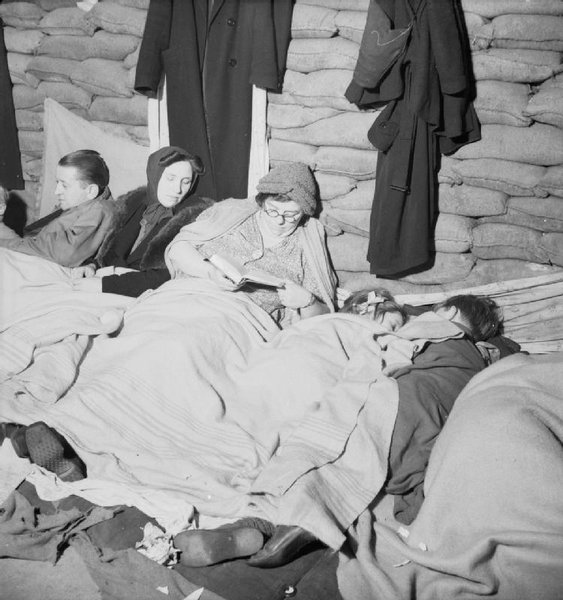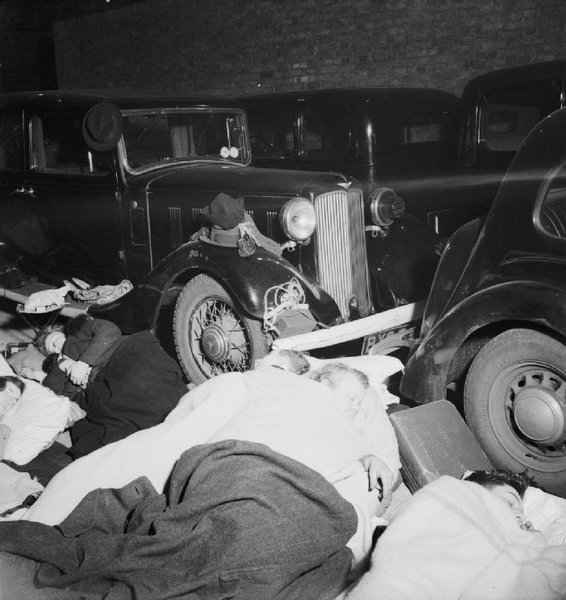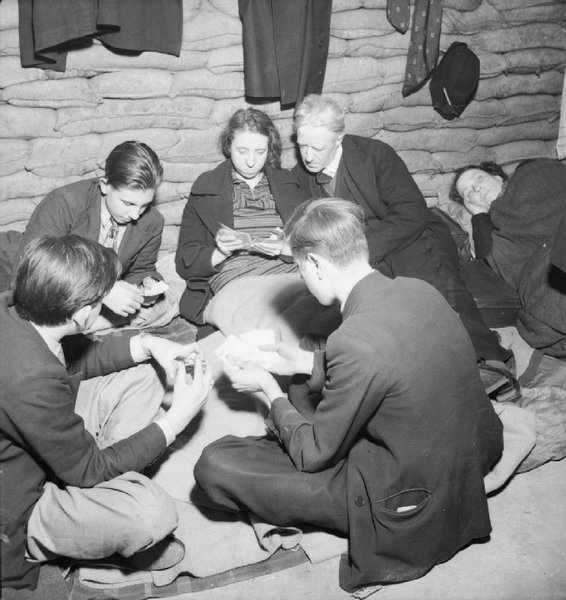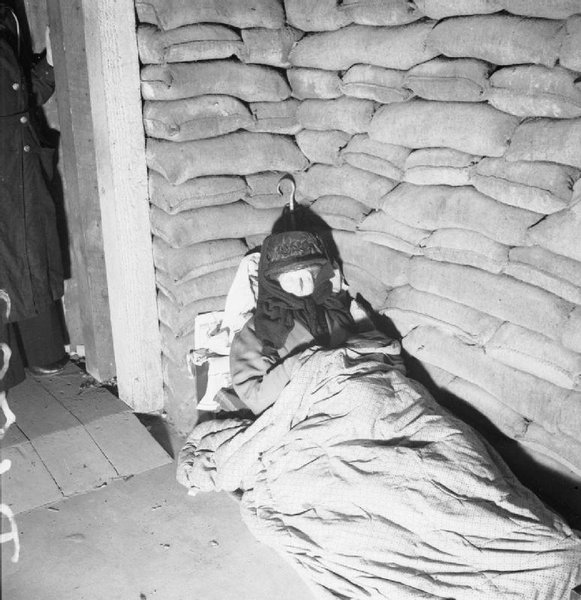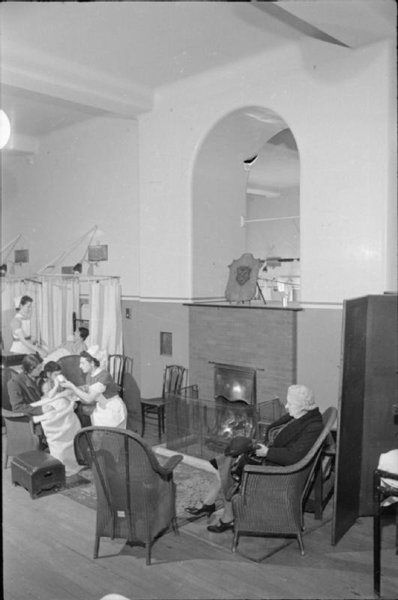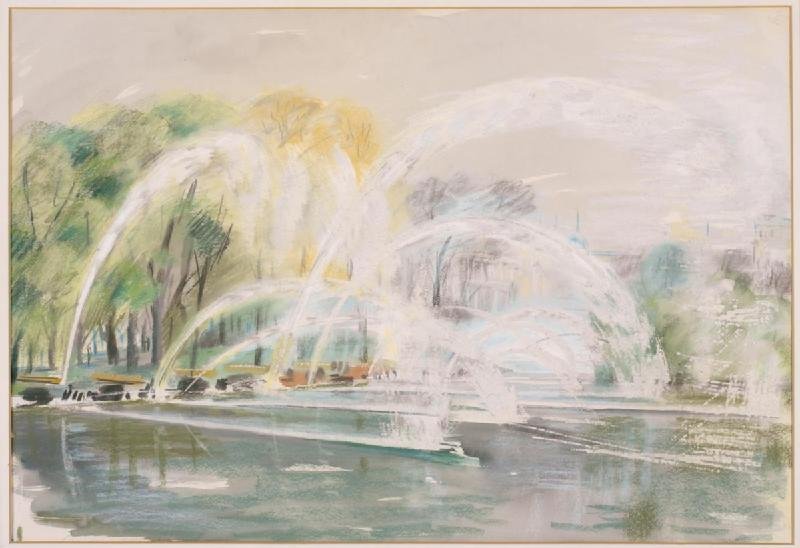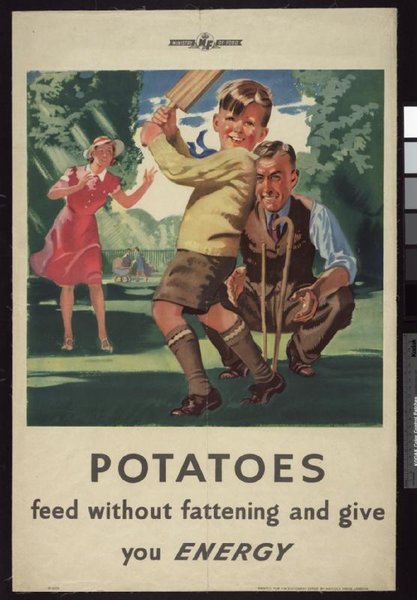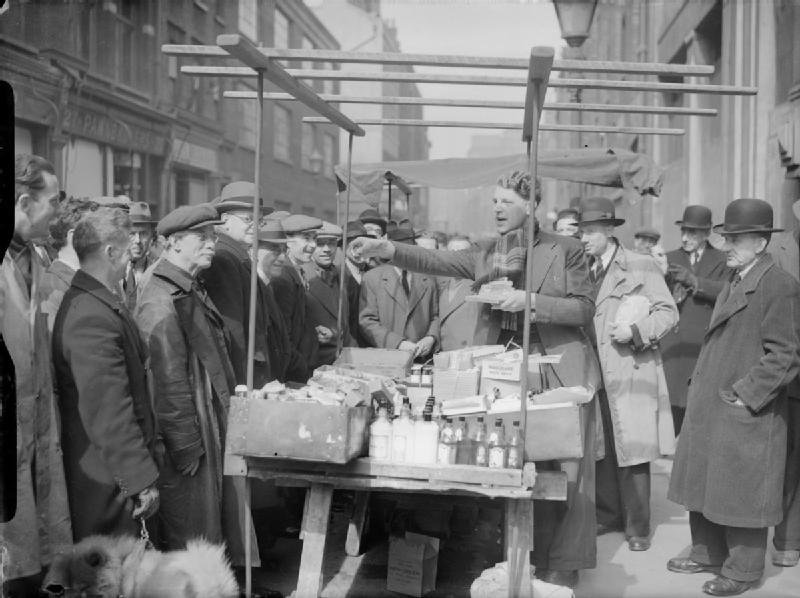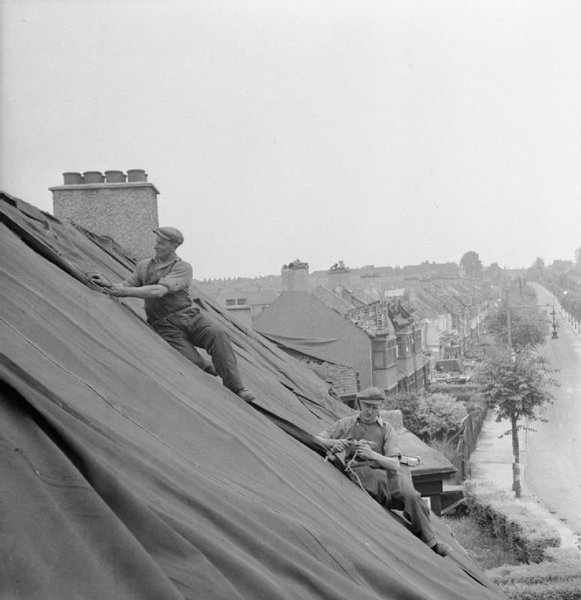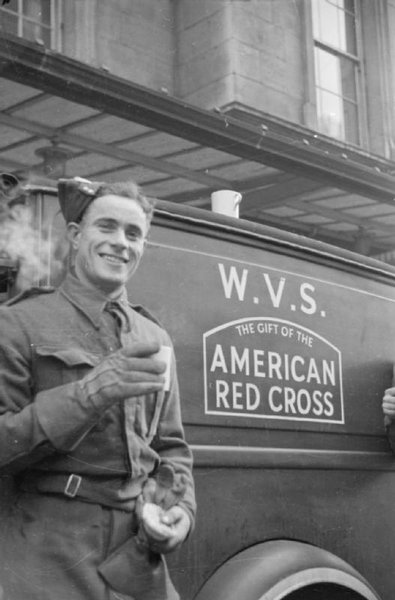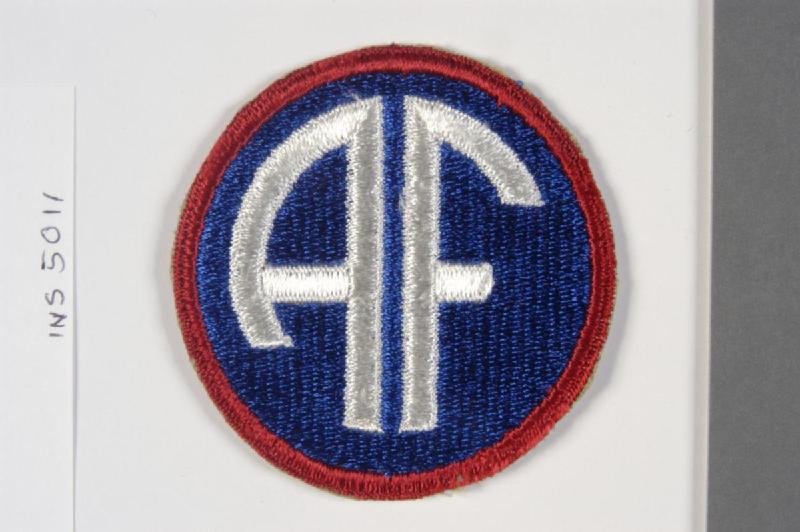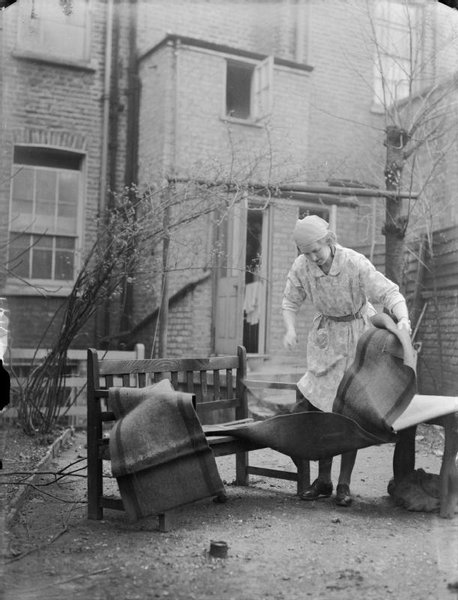High Explosive Bomb at Nine Elms Lane
Description
High Explosive Bomb :
Source: Aggregate Night Time Bomb Census 7th October 1940 to 6 June 1941
Fell between Oct. 7, 1940 and June 6, 1941
Present-day address
Nine Elms Lane, London Borough of Wandsworth, SW8, London
Further details
56 18 NW - comment:
Nearby Memories
Read people's stories relating to this area:
Contributed originally by DOUGLAS ROTHERY (BBC WW2 People's War)
Chapter XI - A Proud Epitaph
Shelling had now become extremely intensive and have been warned to expect a counter attack. A tank to our front was a blazing inferno and was close to a stone built barn, two of my Section requested permission to go to the toilet and they ran to the stone barn, but no sooner had they disappeared inside, it was hit simultaneously by two shells and we couldn't see the barn for a cloud of dust. I was thinking well that's their lot, when out of the dust two figures emerged running like the clappers holding up their trousers, as you can imagine we roared with laughter especially when one them said, 'It was a sure cure for constipation'.
I am not exaggerating when I say that for every minute of the day and night the shelling and salvoes of rockets from the Moaning Minnies were terrifying, one continuous barrage, I have never known such a concentration before on such a comparatively small area. We could hear women and children screaming in terror in the houses to our rear many of which were ablaze, lighting up a moon-less sky. This barrage was still continuing in the morning with the same ferocity, no let up, it was most traumatic and horrifying witnessing this onslaught without any means of personal retaliation but just standing there awaiting the chance perhaps of a reciprocal respite when given the order to advance, these experiences cannot be expressed in words or films. Our exact map location at that very moment I hadn't the slightest idea mainly because Section leaders are not in possession of such, what I did know is that our presence was not at all entente cordial.
Regardless of this slaughter taking place around us, out comes Dad, God bless him, with our mess tins of precious sustenance, dumps it, then scurries back to where he has hidden our vehicle. No sooner had he done so, we sat down on the floor of the trench to partake of our meagre breakfast, leaving Gdsm: Bowse standing on guard and acting waiter. He was in the process of handing me my mess tin by reaching over two others when there was an almighty explosion. I was flung backwards by a terrific force and momentarily stunned. There was a few seconds silence ,then I called on the Mother of God for divine intervention and succour. I eventually could see out of one eye my hearing was naturally impaired, blood was pouring down my face, my arms felt stiff and numb, the front of my tunic was ripped away and both sleeves were in tatters. The poor unfortunate who was leaning over to me, Guardsman Bowse was killed, two others were injured no doubt his body protected us from more serious injuries. I was to learn some time later that a rocket shell had hit the perimeter of the trench so if it had happened a few seconds before we would have been all standing up. Someone put a bandage around my head and eyes and helped me and others into a vehicle which took us to the First aid post about a mile back. They cleaned me up a bit, re-bandaged my head and eyes, put both arms in slings then put me in an ambulance to be taken to the base hospital. No sooner had I laid down in the ambulance than I felt a joy of relief, everything seemed so peaceful, just the rumbling of shell fire in the distance as I gradually unwound from the tension and trauma of hell plus the fact I couldn't remember when I slept last, I was certainly going to make up for it as I went completely out.
Waking up as the cold air hit me, I was carried in on a stretcher into the Base hospital which was a very large marquee somewhere in France. After being put to bed a doctor along with a couple of others gave me a thorough examination and removed the slings from my arms. Apparently my chest arms and face were like a pepper pot caused, according to the doctor, by fragmented stones, these he said would eventually come to the surface and was nothing to worry about and were also in the muscles of my arms causing them to be stiff.
I remained in bed for about 3 weeks whilst they treated my ears and eyes and eventually allowed me to go to the washroom which was the first chance I had of seeing my face and it was a peculiar experience because I didn't recognise myself. Apart from it being peppered it was blown up like a balloon caused by the blast and my eyes were just slits, it was a bit of a shock. They seemed quite concerned about my eyes more so than my ears, which has left me with a steam train passing with its whistle blowing.
Whilst here I felt very proud when other patients on hearing that I was a Grenadier would come over to congratulate me on the achievements of the Guards Armoured Division. ( Div: sign:-- 'The Ever Open Eye'), a sign by looking at me, that must have seemed a contradiction.
This also gave me the opportunity to reflect on the trauma an infantry man uniquely experiences, yet at the end of his stint is not even given any more consideration to those who although not in earshot of enemy action are entitled to the same Campaign recognition which to me makes the medal significance less rewarding. (The powers that be I imagine would say 'You were only doing what was expected of you").. Shame.
After about six weeks I was informed that I along with others were to be flown back to Blighty, I was elated. One morning I along with about ten others, some on stretchers, found ourselves in the corner of a field where there was a lone Dakota, it wasn't long before we were up and away. Flying low over the channel to escape radar detection and on nearing the home coast we climbed, it was a wonderful feeling looking down on a peaceful countryside bathed in sunlight so much so I pointed this out to a fellow on a stretcher whom I expected to share my enthusiasm but he only gave me a scornful look. I then realised he was a Jerry.
We landed somewhere in West Bromwich because it was to a hospital there where I was to stay for a short while, thank goodness! It was very primitive. I was then transferred to a Birmingham hospital where I was eventually allowed out in regulation hospital blue and red tie thus giving me the opportunity to visit an Aunt. I was then transferred to Leamington Spa to the 'Home for the Incurables.' I hasten to add that service personnel were in a separate ward. Each evening a Victorian battle-axe of a matron would literally march through the ward with her entourage, who endeavoured to keep up with her, whilst the patients that were able, had to stand at the foot of their bed until she had passed through, you then had to go to bed. As there were no radio or headphones in the ward we naturally, being interested in the progress of the war sought permission to be allowed to hear the 9pm news in the Rest room, this was refused because it would upset the procedural practice carried on in the hospital for decades. It was decided that it was about time the rules were changed, so come 9pm we would sneak downstairs until one night we were reported. To cut a long story short I was appointed as spokesman and had to appear before the Head Administrator who threatened to report me to the army authorities, I likewise their draconian method of administration. We were granted permission to hear the 9pm news with a promise of headphones for each bed.
After a few months I was sent to Stoke-on-Trent convalescent army camp where after being issued with new clobber I was to meet up with many of my mates now patched up and eager to get back at the enemy. (If you believe that you will believe anything). I was very surprised to meet R.S.M Hufton who had certainly mellowed after his battle inoculation, I didn't know he had been wounded. He called me over and asked me what I was doing that afternoon. I nearly said 'I didn't know you cared'. Anyway he treated me to a football match between Stoke and Portsmouth and afterwards to a Cafe for a tea and a wad. 'There you are, they are human after all'.
After idling our time away here for a few weeks all Grenadiers were sent to Victoria barracks Windsor where I was to meet up with more patched up heroes straining on the leash, but before doing so there was much reminiscing over pints with old acquaintances, one of them being a Sergeant Twelftree who was a pall bearer at the funeral of HM King George V and was one of my buddies when we first went out to France so we had plenty to celebrate about. Unfortunately they were all to rejoin their units with the exception of Corporal Griffiths ex heavy and light heavy weight Brigade boxing champion who, like me was now downgraded to C2 and was to be my Corporal of the guard at the barracks one night. On reveille, Griffiths on dismounting the sentry, (who by the way was a recruit,) marched him into the guardroom and gave him the order to unload and in doing so the recruit inadvertently left a round up the breech and on pressing the trigger the bullet went into the ceiling scattering plaster all around the guardroom much to the amusement of Griff; who was curled up in muffled laughter behind him. The Picket officer a [Young Chicko] walked in immediately afterwards and I thought he had heard the report but apparently hadn't, which I imagined should have woken up all of Windsor, but he was just checking the Tattoo report as part of his duty by asking 'Everything all right Sergeant'. He didn't look anymore than 18yrs old and was at the same time walking around the guardroom tapping the plaster from side to side with his stick. When I explained what had happened he just said 'Oh, oh railly, oh, oh' and off he went. The recruit got off with a reprimand, I believe the shock it gave him was ample punishment.
Whilst here I received a Regimental Christmas and New Year card with the Divisional sign of the Guards Armour (the ever open eye) on the front cover, the card denoted the capture of Nijmegan among other battle honours and it was sent to me by L/Cpl Cox(Nobby) who was one of my Section before he got promoted. I was to learn later that he must have been killed whilst the card was in the post. 'God Bless'.
I was talking to a group of Americans who dressed in their army uniform were waiting at the main gate and had apparently arrived back from France the day before,and I asked them how much they enjoyed the luxurious accommodation of Victoria barracks, I am afraid their response wasn't at all complimentary. They said they were the Glen Miller band and were awaiting their leaders arrival. His disappearance to this day still remains a mystery.
Being downgraded, all that my duties comprised of here were Sergeant-In-Waiting and Sergeant of the barrack guard roles, so R.S.M. Snapper Robinson I should imagine decided that I might have some undiscovered talents which were not forthcoming here because he passed the Buck and me with it to 'Stobbs camp' near Hawick where I was to discover to my amazement, my mate of old standing Dennis Ward of No5 Section who told me that soon after my encounter he was shot receiving a bullet wound in the shoulder and was now pronounced fit enough to be shot at again and therefore was training with a contingent of Grenadiers for Far Eastern engagements.
I don't believe their gastronomic considerations were very high on their priority list because I was sent to H.Q Company to be in charge of their rations where each week I along with a driver in a 15cwt truck would have to proceed to Edinburgh to buy from the N.A.A.F.I. store, an amount determined by the manipulation of an allowance considered enough to sustain about fifty or so hungry warriors. One particular morning I was informed to report for Company Commanders Orders where I was expecting to be formally told that I had been recommended for promotion, unfortunately on meeting the Company Commander, he had just discovered at this late hour, that I was not A.1 and therefore was extremely sorry but it must be denied me. If the reason for not being upgraded was due to unsatisfactory ration distribution or whatever, I might have understood, but the lesson to be learnt is, when you go into battle, Its not only your life that is on the line but also your promotion so for goodness sake keep your head down. My ambition to join the Police when hostilities ceased was also shattered. Regardless of these adversities, I am proud to say my compensatory reward was having been in the company of wonderful comrades who also experienced the honour of being contributors to the historical glory of an equally glorious regiment
Whilst I was here peace was declared in May 1945 so my rationed superior recipients either seeking revenge or the alternatives to prunes and custard each Sunday lunch, decided to transfer my expertise to( Sefton Park) Slough where I was to remain until my demobilisation and in keeping with the usual Service administrative protocol, I was sent to the furthest point in the South of England, 'Penzance' Demobilisation Centre instead of the one close by namely Reading.
On arrival I was to be very disappointed with the few suits available and when I mentioned this they were very apologetic and came out with the old cliche, 'If sir would come back tomorrow when they were expecting a new consignment', Some hope! No homing instincts were to dominate my dress sense and I was to choose one I considered less conspicuous of the few remaining, a blue serge, which I am sure was made from a dyed army 'U' blanket in which I furtively crept away in, with the princely sum of 75 pounds for which I signed for. So after completing 8yrs with the colours because of the war, instead of the 4yrs in which I enlisted, I was to return home on the 2nd of March 1946 at the age of 26 years to the same establishment in which I left to join up.
That said, I reflect with sadness but with tremendous pride the heroic memories of those whose supreme sacrifice along with their past comrades, have contributed so generously and honourably to the proud epitaph of "THE BRITISH GRENADIERS".
2615652 EX L/SGT ROTHERY. D.. Arthur Baker survived the war after serving his time in the 3rd Batt:and we were never to meet up again until approx; 10yrs after joining the army together. He was married and lived in Guilford
Contributed originally by BBC LONDON CSV ACTION DESK (BBC WW2 People's War)
"I'm a cockney born in Kingsbury Road near the Ball's Pond Road in the East End in 1937, so I was like 4, 5 and 6 when all this happened. I went to a Catholic School and during the Blitz when the air-raid sirens went, we'd get under the table and our teacher would say 'now you've got to pray' so we all prayed until the all-clear went.
One morning at 3, my mum's sister cam in and said 'there's a big bomb dropped near the old lady's house - that's what we called my gran - but she said she's all right. We rushed down the road and saw that a bomb had dropped on a school. I'll never forget, there wasn't a window left in none of the houses around. We went into a schoolhouse, the door was wide open, and there was blind man upstairs which they got our early; the whole ceiling had come down on him. We went into the kitchen and there was only about three bits of plaster left. The plaster round the rose on the ceiling was about the only bit left. I asked the blind man if he was okay and he said 'yeah' so I made him a cup of tea. We was lucky because if that bomb had dropped at three o'clock in the afternoon it would have killed all the kids.
I'll never forget this, the front door swung open and a fireman stood there. He said 'Everyone all right?' and one of the women said, well, I can't say what she said, but to the effect of 'that xxxxx Hitler can't kill me!'
We lived off the Ridley Road at the time and during one of the air raids one night, everyone went down the shelters and my dad said to me "Want to watch the airplanes?' My mum said 'That's not a good idea', anyway, he put me on his shoulders and we stood in the doorway and watched the dog-fights overhead. And I tell you, when them German planes got caught in the headlights, they had a hell of a job to get out. Anyway, the morning after these raids, all us kids'd go out collecting shrapnel from the shells, I had a great big box of the stuff.
Was I scared? Only when I was in bed at night and the air-raid warning went. When you're asleep and you suddenly woke, you didn’t' know what was happening so it was pretty frightening. At that age, you didn't know what air raids were all about. Some of the time I slept in the cupboard under the stairs and it felt a bit safer there.
One day, I went round to the corner to my aunt's house and she was sitting by the window when there was an air-raid warning. Inside the window where she was sitting was a table with a statue on it. They told her to come in away from the window. I'll never forget this, there was a bomb blast, the window come in and the statue toppled off the table and onto the floor. If she hadn't have moved, she'd have been covered with flying glass.
My dad didn't go in the army, because he was wanted on the railways. He took me down the dog racing one day at Hackney Wick. This flying bomb - a doodle-bug it was - suddenly appeared over us. You could see every detail of it. We all ran. It went right across the track and dropped in a field somewhere.
One day a landmine dropped near us in Kingsbury Road and didn't go off. A fellow came down from the Bomb Disposal unit, to try to disconnect it and he got killed. Opposite us there was a block of flats and they named it after him - Ketteridge Court.
I was evacuated for a little time, to Kettering, but I don't remember much about it, only that I didn't like it. I'd have to ask my mum about it. She's 100 but still remembers everything.
Me and my family are Pearly Kings and Queens and we do a lot of charity work, entertaining with music and the old cockney songs and that (Phone 020 8556 5971). We are now the biggest 'Pearly' family, made up mostly of the Hitchins (my mum's family name) in Hoxton, Tower Hamlets, Hackney, Clapton, Shoredich, Hommerton, Dalston, City of London, Westminster, Victoria, Islington and Stoke Newington. "
Contributed originally by epsomandewelllhc (BBC WW2 People's War)
The author of this story has understood the rules and regulations of the site and has agreed that his story can be entered on the People's War web site.
A FLYER'S STORY
When war broke out I was working for the Phoenix Assurance Co in the City. I decided to volunteer for the Air Force - to avoid going into the army!!
In May 1940, I was summoned to Cardington to be attested. This consisted of having interviews and a thorough medical examination; and then swearing an Oath of Allegiance to King George VI, his heirs and successors. Finally I was given the rank of Aircraftsman 2nd Class and a number 1161718. Some weeks later I had to give my name and number to a Corporal who said “that’s not a number, it’s the population of China! As far as rank was concerned, I had eight during my six years with the RAF, ending up as a Flight Lieutenant.
In September 1940, I was sent to the Elementary Flying Training School (EFTS) at Hatfield, learning on Tiger Moths. While I was there, an incident occurred which still sticks in my memory. One particular day in October, was a day of low cloud and strong winds and all the Tiger Moths were grounded. All the members of the course were therefore given extra lectures/ Suddenly during a lecture, there was the sound of a low flying aircraft flying across the airfield. One young cadet, looking out of the window said “That’s a Junkers 88” There were cries of derision and some said “It’s a Blenheim” Almost immediately the air raid siren sounded and we all dashed for the shelters. Before we could reach them, the Junkers 88 returned, flew across the airfield, was hit by flak, but dropped four bombs on the de Haviland factory at the far end, causing several casualties and great damage. Many years later, I learned that the new super aircraft, the Mosquito was being built there. I have reflected since, that the crew of the Junkers 88 were brilliant navigators or very, very lucky.
When being trained by Flying Officer Kelsey at Hatfield, he often used to ask pupils to practice a forced landing in a field as if your engine had failed. He did this with me twice, but we found he had an ulterior motive: when we had landed in the field, he jumped out of the Tiger Moth and said `follow me'. I taxied the aircraft round the field to take off again and he would be walking along picking mushrooms. He was very fond of mushrooms and took them back to the mess for his breakfast!!
One of the rather sad things was that at the beginning of every course, which included about 50 men, they always took a picture of all the pupils and that was partly because it was recognized that some would not survive. If you went into a training establishment after the war had started, you would always find some of those in the pictures with little haloes drawn over them - they were the ones who had died. There would be up to about five in the 50 who wouldn't make it. I can't really remember a group photograph where no one had been killed.
I was at Hatfield for about 6 weeks and then went to Hulavington, Wilts. where I was flying Hawker Harts and got my wings.
I finished my training at Sutton Bridge on Hurricanes. I found Hurricanes very difficult to start with. The others were biplanes and this was a monoplane and flew at least twice as fast. The feel of it was very different and seemed to me to be going terribly fast, but when I got used to it, I did like the aircraft. On the other hand, it was somewhat more unstable than the Spitfire and required much more active hands-on flying, whilst a Spitfire when trimmed properly was much easier to handle and in good weather would almost fly itself.
For the next 6 months after training, I went to a fighter squadron in Orkney, where it was very bleak and the wind never stopped. The fighters were there firstly because of Scapa Flow and secondly to try to stop the Germans flying out into the Atlantic. They had big aircraft called Condors as well as Junkers 88s. There is a gap of about 100 miles between Orkney and Shetland which needed covering. The Germans didn't want to go right up to the north by Iceland. There were two fighter squadrons stationed up there, one on Orkney and the other was split between the Scottish mainland and Shetland, to cover these two jobs.
Was I afraid? Not usually. It is true to say that your training gives you confidence which carries you along quite a bit but there is also a feeling that it will always `happen to the other fellow' and you don't think about injury or death happening to yourself, except if you are actually in the middle of a very nasty situation. It something you just get used to.
My next job was as an instructor for almost a year at an Operational Training Unit to teach on Hurricanes and Spitfires. All the pupils already had their wings. The thing is, a Hurricane is a one-seater so you couldn't sit in with a pilot, but there was a Miles Master which was similar to the Hurricane but was a two-seater. The Instructor sat in the back and the pupil was in the front and the most important things to learn were taking off and landing. When you thought they could manage, you sent them up on a solo in a Hurricane with fingers crossed and hoped they could do it.
After leaving the OTU I did some Army co-operation work and some aircraft delivery.
I then transferred to 1697 flight at Northolt in July 1944. This was called Air Despatch Letter Service. We had Hurricanes specially adapted to carry mail. They had a special space behind the pilot and it was also possible to use one of the under--wing fuel spaces for mail. The object of this was to fly despatches from Normandy back to London. We used to fly the Hurricanes in to the airstrips and despatch riders would come from the front bringing despatches for London. It took about an hour to fly the distance back to Northolt where another despatch rider or driver would take it straight in to London, so an action which might have taken place at 7 a.m. would be reported in London by about 10 a.m. This practice gradually spread a11 over Europe as the armies advanced. We advanced with them, flying to the nearest airstrip and collecting despatches for home.
On 26 August 1944, I flew information from Balleray in France to Northolt all about De Gaulle's entry into Paris and it was very interesting to see it in the papers the next day, knowing that I had carried it in.
VE Day was very busy and I made three flights on 8 May, flying from Germany to Holland and Holland to Northolt and then back to Germany. During the post-war period we were even busier than before with mail and information, clocking up a lot of flying hours. It was during this time that I was able to have a little flight on a Focke Wulf 190 which we had captured. It was very interesting but was extremely fast and it was a little unnerving in a way because there was so much electrical equipment. Instead of levers many of the controls were just little buttons so you controlled it very tentatively hoping it would do the right thing.
My last flight as a member of the Royal Air Force was in a Spitfire on 5 April 1946 but in 1953 I did some flying at Redhiil as Air Force Reserve, because I have to admit, I missed flying. However, I finally stopped flying in May 1953 and have not flown since. I totaled up 1527 hours of which I would think half was in Hurricanes.
I didn't find running the mail dull. I enjoyed pilot navigating, taking myself from one place to another. When you trained, you did cross-country flights and set a course from A to B using landmarks to help you along. If it was bad weather, you came below the clouds and if it was too bad, you just couldn't fly. You did have radio to help you, but it was very unreliable so you needed to be able to manage without it. The airstrips were just that -just a cleared field with a runway laid by engineers. You just had to find it by checking the little villages and knowing which ones they were.
Coming in from the sea you could check where you were as you crossed the coast by the shape of the coast and the placement of the villages.
You soon learned not to get lost but it was possible to do so. The first time I took out a Spitfire - in England, fortunately - I got completely lost because it was so fast. When I looked back the place I took off from was gone. I was in rather a panic but I should have realized that by flying west to the Welsh coast and turning right I would have got to Carlisle which is where I was supposed to be going. I didn't think of it because I was in a panic but that was early on in about 1941 before I got used to finding my way. I landed at an airstrip I found and tried again. Not a very good example of good airmanship! ! !
When we weren't flying, we didn't do very much really. There were always a few of us about for company. We used to stay on the aerodrome mostly. We might mooch up and chat to the Air Controllers to see what was happening and if anything interesting was coming in. When we used to fly to Germany, later on, there was a big aerodrome built which had a lot going on. We lived in a little house with a stream behind which was lovely and a nice area to go for walks. There were very few female personnel about. However, fraternising with local German girls was very much discouraged. After the war was over, we were still there for quite some time and there used to be dances which female service personnel used to attend, which were very nice, but overall it was a very masculine life. We used to be wrapped up in flying and aircraft very much and I must say I was never bored.
It is said that some people found it very hard to settle dawn to civilian life again but I can't say I had any difficulty. To be honest, after risking your neck to some extent for six years, it was quite nice to be able to say you were going to live a normal life again.
I was very fortunate in being able to go back to my job at the Phoenix Assurance Co. First of all, they had a rule that no married women could work at the Phoenix, but they did relax that later. They were a very good company and even paid us while we were in the services. Before the war my salary was £120 a year, but even during the war they paid about £60 p.a. When I came back to work for them, my pay was £300 p.a. That wasn't a lot, but you could get married on that. In fact, I met my future wife at work a few months after I returned.
Arthur Lowndes AFC
Contributed originally by stalbanslibrary (BBC WW2 People's War)
At the beginning of 1940 i was evacuated to a very grand house near Winchester.It was a private arrangement and our wartime guardian had been at one time a Financial Secretary to the treasury in Lloyd George's government.I was thirteen years old.
Our mother remained in london and had taken in a lodger Dorothy Blackadder as a wartime expediency.Miss Blackadder as I knew her,was the secretary to the speaker of the House of Commons,Edward Fitzroy.She had promised me a trip to both Houses of Parliament as a treat for my birthday on May 10th.As it was to be such a special occasion,the beginning of teenage,and there had not been air raids on the capital I was allowed to come up to London on the day before.
i was looking forward to the trip very much,not particulary as an educational outing,but to get home again to see my mother,and to have just that little extra attention lavished on me on that special day.my mother had made me a new outfit of a pink dress and navy blue coat with a pink lining to celebrate the occasion and I felt proud and grown-up.
the morning was warm,a glowing mistiness suggested it would get hotter as the day wore on.There was peculiar poignancy in the summer starting early since I knew that overnight the war had taken a turn for the worse.I could tell by my mother's face and the way she kept clicking her tonge against the roof of her mouth..
I was to meet Miss Blackadder outside Sloane Square station.I was happy to be in London again.Overhead the sun rose through the haze shortening the shadows and drying up the last of the moisture left by the shopkeepers in their early efforts to freshen up their fronts.The barrage balloons glinted with silver in the smoky blue of the sky.Then all at once,propped beside the flower seller with her perennial display of violets,primroses,rosebuds and asparagus fern wers the newspaper placards alerting us-BELGIUM,HOLLAND AND LUXEMBURG INVADED- in huge bold letters.The newspaper boy was doing a brisk trade -'Allies answer call for aid- Leopold at head of army',someone read aloud.The battle was beginning.
When i met Miss Blackadder she said the timing of my visit was fortuitous as it was expected to be a very active day in the commons.She took me first to the Speaker's house set along side The Houses Of Parliament.Here she went to her office to pick up her mail and orders for the day.Mr Fitzroy came in briefly and I was introduced as her young friend.I think she must have asked his permission beforehand to bring me along as he did not seem surprised to see me.He was too serious,however to dally and said something to the effect that their would be 'fun and games' this day and that Winston churchill was expected later that morning.The most impressive thing I can remember about the Speaker's house was an enormous stuffed black bear standing on its hind legs in the hall- a fearsome creature about fifteen feet tall.There was also a big Cabinet Room,opening out of the hall,inside which I saw briefly a big round table furnished with blotters and carafes of water surrounded by chairs.
it was still relatively early and miss blackadder said it would give us time to have a look around.From her office we went to Westminster hall which was the oldest building in the complex.It was very large and Medieval in appearance and more or less empty save for a few people walking about.It was cold and darkish.She did relate to me some of it's history which unfortunately I have forgotten.We then moved to The House Of Lords which I found very exciting.Two or three attendants were on hand who I think must have also been briefed about my coming as they seemed ready to take me over.Of course I saw the Woolsack and even sat on it.It was much bigger than I imagined.I was then shown the Robing room lined with big cupboards in which the lord Chancellor,Bishops and peers kept their ceremonial dress.Inside there was ermine and lace,dainty looking pumps on low shelves and wigs hanging on stands.They put a wig on me for fun.Then they brought out the long silver-topped Black rod from its fixture and showed me the patch on the huge wooden door on which it struck three times to gain attention of the Commons.The official who does this is called Black Rod and the door seperates the House of Lords from the Commons.He acts as a messenger to summon the MP's into the chamber of the Lords to hear the Sovereign's speech on the stste opening of parliament.For a few seconds I was allowed to hold the rod myself which is made of ebony.
We then went though this door ourselves, passed panelledand over tiled floors to the vast chamber of the Commons where the elected MP's from all over Britain sit in government.Few had already taken their seats as it was still early.We walked quickly to the other end,past the enormous table on which the dispatch boxes and the Mace are placed,in front of the speakers chair.The speaker was not there,neither was the Mace,signifying that Parliament was not yet in session.Government and opposition sit on differnt sides of the table and the Front Benchers must stand when they are speaking,otherwise their speeches are void.
Again we went behind the scenes.The Mace was being dusted over and the attendant doing this instructed me to put out my arms and he lowered the Mace on to them,never letting go as he knew it was heavy And I might be in danger of dropping it.All my life I have been proud that I once held the great mace of the Commons in my own two arms.We then went upstairs where the press sit and into the Stranger's Gallery from which we had a good view of the Chamber.Here we lingered.More MP's had arrived and Miss Blackadder began to point out some notables.Lloyd George was sitting on the opposition benches aawqay from us.(she told me he had been a famous Prime Minister during the 1st World War),and Lord Halifax the Foreign Secretary.Neville Chamberain the present Prime minister had not yet arrived.There was an air of deep thought and seriousness,everyone in dark suits.
It was getting busy and Miss Blackadder told meshe would have to leave me as she had business to attend to.She took me to the Ladies gallery which was on the same side as the Speaker's chair, high up and where she said I would have a good view of the day's proceedings.There were no other ladies present and she positioned me in a corner and said I would be hardly noticed.The ladies gallery was only for very important ladies and she said Queen Mary sometimes sat here to watch parliament in session and no one knew she was there.I was a bit shy of sitting there all by myself and tried not to be seen.I remember there was a sort of grill over the aperture like a window and a long plush cushion along the bench .The Ladies Gallery isn't there any more because the House O Commons was bombed later in the war and it was not rebuilt as it was originally.
If there was a little ceremony when the Mace is carried in and the Speaker takes up his position on the big chair facing both sides of government,we must have missed it during our excursions as everything was now in position.Mr Fitzroy was in his seatand the day's work had begun.
They started with a discussion of the events of that morning.The tone was serious and veered towards anger.Mr Winston Churchill made his appearance at the far end of the chamber and a small cheer went up.He stood a minute and waved before going to his seat.They spoke about norway and then attention began to be focused on one man - Chamberlain.There were shouts of anger telling him to go.Miss Blackadder told me afterwards that the government and opposition wanted him to resign because they didn't he was a strong enough war leader.It surprised me how MP's could be so offensive to one another and then walk out of the chamber,their arms around each others shoulders apparently the best of friends.
Miss blackadder eventually came to fetch me and stressed that i had witnessed an important chapter in history.Chamberlain would resign and Winston Churchill was most likely to become Prime Minister that evening whent he King would send for him. It was to be him or Lord halifax.
As we came into the daylight to join the crowds beginning to assemble in Parliament Square.There was a green limousine standing on the forecourt with a policeman alongside and a sailor as a chauffer.'That's Winston Churchills car',said Miss Blackadder.'He is First Lord Of The Admiralty,that's why he has a sailor to drive him'.
I have often wondered if any of the press in The Commons that auspicious day had taken any photographs and,by chance,there might be one revealing a smallish girl sitting in the corner of The Ladies Gallery trying not to be seen.
The next day I went back to school in Winchester.The war had really begun.The Battle of Britain started not long after and my mother had a new and rather mysterious lodger.As a result she found herself involved with the Secret Service,and later on I had a passionate love affair with an espionage agent - but all that is another story!.
Contributed originally by Torbay Libraries (BBC WW2 People's War)
This story was submitted to the People's War site by Paul Trainer of Torbay Library Services on behalf of Benita Cumming, the daughter of Ben Cumming, and has been added to the site with her permission. Ms Cumming fully understands the site's Terms and Conditions.
On that fateful day in September of 1939, which fell on a Sunday, I heard on the radio that Britain had declared war on Germany, as that country had invaded Poland, and our country had a treaty with Poland to come to her aid. It came to my mind when I heard this that now was the opportunity for me to break away from the humdrum existence I was leading at that time and enlist to get away from it - providing the conflict lasted long enough for me to participate (the general opinion at the time was that it would be over by Christmas).
The next day in the local newspaper was an advert for young men, at least 5 foot 11 inches tall, who were wanted as recruits for the Brigade of Guards, and right away I thought, "That's for me!" The first opportunity I had, I was off to the Recruiting Office in Torquay and got signed on. I was given a railway warrant to get me to Exeter, where I went to the Army Barracks there, had a medical examination, passed and got accepted for the Grenadier Guards. I hadn't said anything at home about what I was going to do and when I got back that evening and told them the news, they were very proud of me but also very worried about what was going to happen to me.
I hung around for a few days saying my goodbyes, whilst I waited for a railway warrant to take me to London and Chelsea Barracks, the Guards Depot to where I had to report. My mates said I was crazy, but they all wished me well, and then I was off. It was late at night when I finally arrived at the Depot and was given a meal and put in a room with other new recruits, some of whom were to remain comrades with me for the next five or six years. It was all a very strange experience for me; the farthest I had ever been previously was a school trip to Swindon to view the Railway Sheds!
We did not see anything of the world outside for a couple of months as before being allowed out, recruits had to be able to walk properly as becomes a Guardsman. My Army pay was 14 shillings (70p) a week, of which I made my Mother an allowance of five shillings (25p) a week. After a few days we were issued with a pair of hobnailed boots and a khaki uniform with brass buttons, and on our legs from knee to ankle we wore puttees (strips of cloth). It was the same kind of uniform that troops who fought in the First World War wore. We did not get proper battle-dress until much later. I had to take a lot of stick from my new comrades because as I came from the West Country, they called me a Swede Basher and said that I had straw sticking in my hair.
The next few months were spent drilling and marching on the barrack square and being toughened up in the gymnasium, until we were considered to be fit and efficient enough to be changed from recruits to Guardsmen. We were then put on what was referred to as Public Duties - that is, going on guard at St. James' palace and Buckingham Palace. We also had to do guard on the bridges over the Thames as the I.R.A. were attempting to blow them up.
In early 1940, in the period known as the "phoney war", the Russians invaded Finland. Chamberlain, the then Prime Minister, had the crazy idea of sending an expeditionary force to go to the aid of the Finns. I was sent on embarkation leave prior to joining that force but fortunately the plan was scrapped; it would have been catastrophic if it had been allowed to
go ahead. However, I had gone on leave carrying all my equipment, including a rifle and ammunition. It was my first leave since joining up and the situation had changed a lot since I left home; Joan had left to join the N.A.A.F.I. and my parents could not keep up the mortgage payments on their house at Danvers Road. They had applied for and been granted a house, 23 Starpitten Grove, on the Watcombe Council estate. It was a nice little house, newly built in a cul-de-sac but miles from Torquay town. Sometime after I learnt that Father had been drafted away somewhere in the country, helping in the work of constructing an Army camp. Mother was left on her own and she had to take in some evacuees from the East End of London, two or three boys I think, and I gather they were a right bunch of hooligans. My sister Mary, or "Blossom" as she was known, came to live with her, which made life a little easier for Mum.
The early spring saw the invasion of Belgium by the Germans, and British troops were rushed to the border of France and Belgium to try to stem them, but they were brushed aside and had to retreat, eventually to be evacuated from Dunkirk. The Luftwaffe began their bombing campaign and the Battle of Britain had commenced; the fear in this country was that the German army was about to mount an invasion as barges had been spotted moored at ports on the French coast across the English Channel. There was also the possibility that parachutists would be dropped in great numbers on strategic targets. My mob was the holding Battalion and we were stationed in London for the defence of that city and we were put on alert to counter the dropping of any airborne troops.
One duty was being taken by military transport to various Police stations in the Metropolitan area and two Guardsmen would ride in the Police cars when they went out on patrol, so that there would have been a quick armed response to anyone dropping from the sky. Then, the company I belonged to were sent to possibly defend the peninsula at Greenwich, the location now of the Millennium Dome. In 1940 there was a vast complex there owned by the South Metropolitan Gas Co, where it was reputed they made everything from Poison Gas to Epsom Salts. That in itself was unimportant, but the site itself was important, as whoever was in control there would control the traffic on the River Thames. The area around there was being very heavily bombed. One of our duties during the raids was, if incendiary fell on to the Gasometers, we had to clamber up and place sandbags over them, which was a pretty hairy experience.
After a spell there my company were drafted to Wakefield in Yorkshire, to join as reinforcements to the Third Battalion which had been badly mauled in France, and was in the process of being reformed. We were put into Civvy Billets, which was a great treat after being in barracks in London, having a decent bed to sleep in and home cooking; it did not last very long as the Battalion moved to the East Coast of Lincolnshire and Norfolk where we bivouacked, dug trenches and prepared positions to prevent the landing of enemy troops if they attempted the expected invasion. However, Hitler called off operation "Sea Lion", as it was codenamed, and we were ordered to stand down. There were stories at the time that some invasion barges had tried to land an invasion force somewhere along the East Coast and oil had been poured on to the sea and had been set alight. Rumour had it that burnt corpses had been washed ashore, but I never saw any myself.
We then had another change of duty. We were sent to where the aerodromes of the fighter planes operated from (viz: Biggin Hill and Henley) as the Battle of Britain raged on; the Germans had a ploy of following returning aircraft and shooting up the runway. An ingenious means of defence was sunken pillboxes which by the use of hydraulics rose from the ground and could be used to engage any incoming enemy. Eventually, the R.A.F. formed their own Defence Regiment and we went off to the Home Counties, mainly Surrey, to resume battle training. One location was Lingfield in Surrey where we were billeted in what was formerly racing stables, which was an ideal billet on the grounds that one was able, when off duty, to slip in and out surreptitiously without being caught.
Having a drink in the local pub one evening, I met a girl named Jessica, and after a few more meetings we began a relationship. I soon found out that she was married to a soldier and I should have ended it, but as it was wartime, one's morals were not as good as they ought to have been, and we spent as much time together as we could. It was wonderful whilst it lasted, but it all came to an end one night when I was with Jessica at her home, and she cried out that her husband and his father were approaching the front door. It transpired that they had found out she was having an affair with a Guardsman and they intended to give me a good going over. I scarpered out the back way and got clear. A couple of days afterwards the Padre of the mans unit came to see me and accused me of breaking up the marriage, and I got reprimanded by the Adjutant and was transferred to the Fifth Battalion, which was stationed in Yorkshire. A sad end to a romantic interlude.
The war had been going on for a couple of years now, and the situation was not looking very good for Britain. Italy, of course, had allied herself to Germany and now the Japanese had entered the conflict against us and the United States. The Japanese were defeating us in the Far East, and in the Middle East the Germans and Italians had us on the run. All the Army who were stationed in Britain could do was to carry on training hard and build up enough strength in manpower and armaments to be able one day to counter-attack the enemy abroad whenever and wherever possible and eventually mount an invasion on the mainland of Europe. Most of the training we did was in the north, over the bleak Yorkshire Moors. At Christmas in 1942, we were at a place called Louth in Lincolnshire, billeted in stables and barns on a farm. Some of my comrades who knew I had been a butcher persuaded me to kill and dress a turkey, which operation I duly carried out using my bayonet. It was a huge bird, about 20-30Ibs, and we boiled it and had it for Christmas dinner. It was not what you would call a gourmet meal!
In 1943 we moved to Scotland to go on manoeuvres in the highlands; at the time of course, we were unaware what our ultimate destination would be. The powers that be were of the opinion that that particular terrain was similar to that found in North Africa, which was where we were destined to invade. The first place we arrived at was Ayr, where we bivouacked on the racecourse there (we seemed to have had an affinity with horses!) From there we were sent on a scheme to the Isle of Arran which lies off the coast of Ayrshire, way across the Island and get picked up on the other side a few days later. It was in the middle of winter, we were split into pairs, were not given any rations and were told to live off the land. The idea of the exercise was how to survive in an hostile environment. My luck was in; on the second night we came across an isolated cottage which was occupied by an elderly couple who were frightened out of their lives when they saw us! But the best thing was, there was a middle aged woman who was staying there; she was the wife of a Naval Officer and apparently, she had come there to get away from Glasgow, which was being heavily bombed. Anyway she took a shine to me and that was that, enough said! I would not have minded staying another month or two there. My mate and I made our way to Brodick on the coast where we were to be picked up. There were some shops there and it did not seem that things were on rations. All commodities were supposed to be rationed in wartime Britain, but I was able to purchase several packets of tea and sugar which I sent home when we got back to Ayr, which was much appreciated by
Mother.
After a spell in Ayr we then moved to a mining village called Tarbolton, where we went into civvy billets which was a real treat, especially if the man of the house was on night shift! But after that the honeymoon period was over for we poor soldiers, and we were now due for real hardships. We embarked at Ayr on to a ship and steamed via the Sound of Bute to Loch Fyne and dropped anchor at Inveraray, where we stayed on board for several months staging amphibious landings and trekking over the Highlands and training in the art of combat with the Commandos at Fort William. This took place in the most appalling weather conditions - driving rain, snow, freezing nights - and it was worse than anything we were to experience overseas. Eventually we sailed out of the Loch via the River Clyde and disembarked at Perth, where we stayed a while in a carpet factory there, awaiting a Troopship to transport overseas. I went on embarkation leave from there and had a few days at home. My other sister, Joan and the man she married, Alec MacPheat, were both there. He was on war work in the area, at a small factory at St. Marychurch, turning out aluminium parts for aircraft. He had been invalided out of the army which was where Joan met him, when she was working for the N.A.A.F.I. My father was also working at that factory as a cleaner. Bloss and Tony, her son, were also there. Tony, who was just a small child then, can remember me coming home with all my equipment and weaponry. It was the last time I ever saw my mother.


